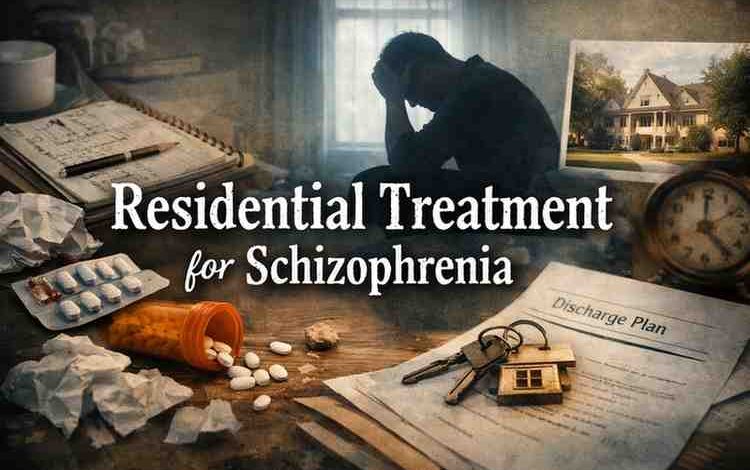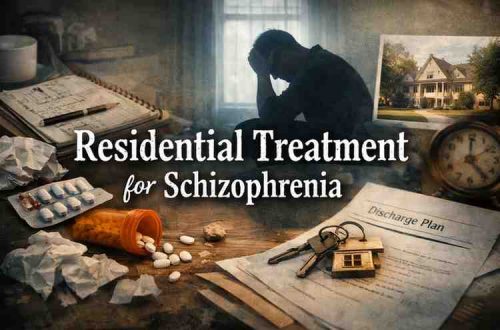

Honestly, I didn’t think this would work. I’d already burned through three “plans” that were supposed to help and only left us more tired and more broke. When someone first said Residential Treatment for Schizophrenia, my gut reaction was a mix of hope and a weird, sour shame. Like… are we really at that point? Not gonna lie—I felt stupid for hoping again. But things were already sliding. Missed meds. Nights that stretched into panic. Arguments over tiny stuff that felt enormous at 3 a.m. I was desperate for something that wasn’t another half-fix.
So we tried it. And yeah—parts of it helped in ways I didn’t expect. Parts of it didn’t help at all. Some of it honestly surprised me. Some of it hurt. This is the messy version of what I learned, not the brochure version.
Why we even considered residential care (aka the point of no more pretending)
We didn’t wake up one day and choose a residential program. We drifted into it after:
-
outpatient therapy that kept getting rescheduled
-
medication plans that worked for a month, then stopped
-
“crisis visits” that stabilized things for 48 hours and then… nothing changed
-
family burnout (this one doesn’t get talked about enough)
What I misunderstood at first: I thought residential treatment meant locking someone away until they were “fixed.” That fear kept me stuck longer than it should have. From what I’ve seen, at least, good programs are more like structured, 24/7 support when the basics—sleep, meds, routines—have fallen apart. It’s not punishment. It’s scaffolding.
Still, it felt like admitting failure. That emotional hit is real.
What residential treatment actually looked like day-to-day (no glossy version)
The reality was quieter than the drama in my head.
A typical day looked like:
-
meds at the same times, every day
-
check-ins with staff (short, frequent)
-
group therapy that sometimes clicked, sometimes didn’t
-
one-on-one sessions focused on coping with voices, paranoia, and stress
-
boring routines (meals, walks, downtime)
Boring turned out to be good. Stability is boring. Stability is also what we were missing.
What surprised me:
-
The structure mattered more than any single therapy technique.
-
Staff consistency mattered. When shifts changed constantly, progress stalled.
-
Small wins counted. Sleeping through the night was a bigger deal than any breakthrough talk session.
What I messed up at first:
-
I expected fast results.
-
I treated “no crisis” like “no progress.”
-
I hovered. Too much. It made things worse.
How long does it take to see results? (the question everyone asks)
Short answer: longer than you want. Shorter than you fear.
From what I’ve seen, at least:
-
First 1–2 weeks: stabilization. Fewer spikes. Not better, just less chaotic.
-
Weeks 3–6: routines stick. Med side effects get adjusted. Some emotional softening.
-
2–3 months: actual skills show up in real situations (handling stress, asking for help before things blow up).
-
After discharge: this is where people mess up. The transition back home can undo gains if support drops.
Not gonna lie… I wanted a timeline with dates circled in red. It doesn’t work like that. Progress came in lumpy bursts. Then plateaus. Then tiny backslides. Then another step forward.
What worked (and what didn’t) — real patterns I noticed
Worked better than I expected:
-
Medication monitoring. Adjustments happened faster with daily observation.
-
Sleep routines. Fixed bedtime sounds childish. It helped more than therapy some weeks.
-
Peer normalization. Seeing others manage symptoms made the whole thing less isolating.
Didn’t work the way I imagined:
-
Group therapy every day. Some days it landed. Some days it felt performative.
-
One-size-fits-all coping skills. Breathing exercises helped sometimes, not during intense paranoia.
-
“Motivation talks.” You can’t pep-talk psychosis away. Period.
Don’t repeat my mistake:
-
Don’t assume compliance = recovery.
-
Don’t ignore side effects because “it’s working.”
-
Don’t let the discharge plan be vague. That’s where things unravel.
Common mistakes that slow progress (I made two of these)
-
Treating residential care like a cure. It’s a support phase, not a magic switch.
-
Arguing about insight. Pushing “do you see it now?” backfires.
-
Skipping family involvement. Programs that involved us helped more after discharge.
-
Ignoring trauma history. Symptoms don’t exist in a vacuum.
-
Rushing discharge because of money. I get it. Still a mistake if the plan isn’t solid.
Honestly, the biggest slowdown was my impatience. I wanted proof. Progress looked boring. Boring was progress.
Is it worth it?
This is the part people want a clean yes/no on. I can’t give you that.
For us? Yeah. It was worth it. Not because everything got “fixed,” but because the floor stopped dropping out from under us every week. The chaos dialed down. That alone changed the game.
When it’s worth it:
-
repeated crises
-
meds not sticking
-
safety concerns
-
family burnout
-
outpatient care not holding
When it might not be:
-
symptoms are mild and stable
-
strong outpatient support is already working
-
the facility is under-resourced or generic
-
the person is being forced without any consent (this gets complicated legally, but forced care often backfires emotionally)
Who should avoid this (or at least pause)
This part is uncomfortable, but real:
-
People who do better with autonomy and already manage routines
-
Anyone whose symptoms worsen in institutional settings (it happens)
-
Those with severe trauma tied to confinement
-
If the only available program feels sketchy (high staff turnover, vague plans, no individualized care)
Residential care isn’t automatically “more serious = more effective.” Bad residential care can be worse than decent outpatient care.
Objections I had (and what changed my mind)
“It’s too expensive.”
It is. Insurance coverage is a maze. Still—multiple ER visits + missed work + crises cost more long-term. I didn’t want that math to be true. It was.
“It’ll make them dependent.”
Structure can create stability. The goal is to slowly transfer that structure back home. Programs that plan for independence helped. Ones that didn’t… yeah, dependency risk is real.
“It’s basically giving up.”
This one hit me hardest. I had to admit I was burned out. Choosing more support wasn’t quitting. It was choosing not to keep failing the same way.
Reality check: what can go wrong
No hype here. Stuff goes sideways.
-
Med side effects can be rough before they’re better
-
Bad staff fit can stall progress
-
Group dynamics can be triggering
-
Discharge can feel like falling off a cliff
-
Insurance limits can force early exits
-
Relapse can happen even after a “good” stay
I didn’t expect how emotionally jarring discharge would be. You go from 24/7 support to… regular life. That transition needs as much planning as admission.
Mini FAQ (People Also Ask vibes)
Does residential treatment cure schizophrenia?
No. It stabilizes. It teaches skills. It doesn’t erase the condition.
How long should someone stay?
Long enough for routines to stick and meds to stabilize. For many, that’s weeks to a few months. Shorter stays can help, but gains may be fragile.
What if it doesn’t work?
Then you adjust. Different program. Different level of care. Different med plan. Failure isn’t the end; it’s data.
Can you work or study during treatment?
Sometimes, part-time or remote. Many programs focus first on stabilization. Expect a pause.
Is it safe?
Quality varies. Look for licensed programs, consistent staff, clear crisis protocols, and individualized plans.
How to pick a decent program (practical, not fancy)
I wish I’d asked these upfront:
-
How do you individualize treatment for schizophrenia specifically?
-
What’s your staff turnover rate?
-
How do you handle medication side effects?
-
What does discharge planning actually look like?
-
How do you involve family (if the patient agrees)?
-
What happens after hours when symptoms spike?
Red flags:
-
vague answers
-
“we treat everything the same”
-
no clear aftercare plan
-
high staff churn
Green flags:
-
they talk about transitions a lot
-
they know schizophrenia isn’t one-size-fits-all
-
they ask about triggers and trauma
-
they’re honest about limits
Practical takeaways (no hype, just what helped)
What to do
-
Treat residential care as a reset + skill-building phase
-
Stay involved without micromanaging
-
Push for a real discharge plan
-
Track side effects and sleep
-
Plan support for the first 30 days after discharge
What to avoid
-
Expecting fast emotional breakthroughs
-
Ignoring discomfort because “it’s working”
-
Letting insurance timelines drive care decisions
-
Treating stabilization like the finish line
What to expect emotionally
-
relief + guilt
-
hope + fear
-
progress + setbacks
-
exhaustion that slowly lifts
What patience looks like
-
boring routines
-
small wins
-
fewer crises
-
slow trust-building
-
uneven progress
No guarantees. No miracle claims. Just fewer fires to put out.
So no—this isn’t magic. Residential Treatment for Schizophrenia didn’t suddenly make life easy or predictable. It didn’t solve everything. But it stopped things from feeling impossible all the time. And for us, that was enough to keep going.



